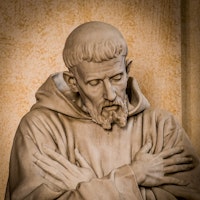O divine Master, grant that I may not so much seek To be consoled as to console, To be understood as to understand, To be loved as to love; For it is in giving that we receive…
Saint Francis of Assisi

The Prayer of Saint Francis
Topic: Serving Others
Lord, make me an instrument of thy peace.
Where there is hatred, let me sow love;
Where there is injury, pardon;
Where there is doubt, faith;
Where there is despair, hope;
Where there is darkness, light;
Where there is sadness, joy.O divine Master, grant that I may not so much seek
To be consoled as to console,
To be understood as to understand,
To be loved as to love;
For it is in giving that we receive;
It is in pardoning that we are pardoned;
It is in dying to self that we are born to eternal life.
Saint Francis of Assisi (born Giovanni di Pietro di Bernardone, circa 1181 or 1182 in Assisi, Italy – died October 3, 1226, in Assisi) is remembered as one of the most beloved figures in Christian history, known for his simplicity, compassion, and profound reverence for all creation. The son of a prosperous cloth merchant, Francis grew up amid comfort and privilege. Yet, as a young man, he longed for the honor and adventure of knighthood. In 1202 he joined the Assisian forces in their war against the neighboring city of Perugia. Captured in battle and imprisoned for nearly a year, he returned home ill, weakened, and deeply shaken. His attempt to resume a knightly career soon afterward was halted by a sudden inner crisis, and a vision near Spoleto turned him back toward Assisi. These experiences broke open his ambitions and stirred in him a longing for a higher purpose. A mystical encounter with the crucified Christ in the ruined church of San Damiano finally led him to renounce his wealth and devote himself wholly to God.
Living without possessions, Francis sought to imitate the humility and love of Jesus, serving lepers, caring for the poor, and preaching peace wherever he went. He founded the Order of Friars Minor—commonly known as the Franciscans—calling his companions to a life defined by simplicity, brotherhood, and joyful dependence on divine providence. His message, at once tender and revolutionary, urged people to see the divine presence in every creature and to embrace a way of life attuned to the beauty and harmony of the natural world. Near the end of his life he composed the Canticle of the Creatures, a hymn of praise that celebrates Brother Sun, Sister Moon, and all beings as reflections of God’s overflowing goodness.
In his later years, Francis received the stigmata—the marks of Christ’s wounds—deepening his mystical union with the suffering and love of Christ. Though frail and nearly blind, he continued to radiate joy and gratitude until his death at the little chapel of the Portiuncula in 1226. Canonized just two years later, Saint Francis of Assisi has endured as a universal symbol of peace, humility, and compassion—a witness to the sacredness of all life and to the power of simplicity to reveal divine love in the midst of the world.
The Prayer of Saint Francis
Easwaran, Eknath. God Makes the Rivers to Flow: an Anthology of the World's Sacred Poetry & Prose. Nilgiri Press, 2009, p. 109 [The Prayer of Saint Francis].

Saint Francis of Assisi

About the Prayer of Saint Francis, the Peace Prayer [Commentary]
Quote Investigator: Christian Renoux, an Associate Professor at the University of Orleans, France, investigated the origin of this prayer and was able to trace it back to an appearance in French in a magazine called “La Clochette” in 1912 where it was published anonymously. This research is discussed in a short article titled “The Origin of the Peace Prayer of St. Francis” which is available at a website of “The Franciscan Archive”
There is no compelling support for an attribution to St. Francis. Renoux states that around 1920 the prayer was printed on the back of an image of St. Francis with the title ‘Prière pour la paix’ (Prayer for Peace). This suggests to QI a natural mechanism for the creation of the ascription to St. Francis.
In 1927 a version of the prayer appeared in English in a periodical called “Friends’ Intelligencer” published by the Religious Society of Friends also known as the Quakers. This is the earliest instance in English that QI has located. Immediately preceding the prayer the following attribution was given: “A prayer of St, Francis of Assissi”. Note the spelling of Assisi within the periodical used the letter “s” four times [FAFI]:
“Lord, make me an instrument of your peace;
where there is hatred, let me sow love;
where there is injury, pardon;
where there is discord, union;
where there is doubt, faith;
where there is despair, hope;
where there is darkness, light; and
where there is sadness, joy.
“O Divine Master, grant that I may not so much seek
to be consoled, as to console;
to be understood, as to understand;
to be loved, as to love; for
it is in giving that we receive,
it is in pardoning that we are pardoned, and
it is in dying that we are born to eternal life.”
Amen.
The text of the prayer above has been reformatted for readability. The passage in “Friends’ Intelligencer” was printed in two simple paragraphs with a break at the phrase “O Divine Master”.
In January 1932 a version of the prayer was published and credited to “St. Francis of Assissi” in a weekly titled “Young India”. The editor of this periodical was Mahadev Desai who today is best known for being the personal secretary of Mahatma Gandhi. Desai provided the following introductory remark for the prayer [MDYI]:
For us the unworthy followers of Bapu and the Sardar who are today thrown, seemingly leaderless and helpless, in impenetrable darkness, to work towards the life-giving light of Swaraj I cannot think of a better prayer than one I received yesterday from two Christian friends who send their “love and prayers and living faith in the triumph of truth through suffering as part of that sympathy which is being borne out to you all by countless numbers in these very difficult days.”
Eknath Easwaran About the Prayer of Saint Francis
Francis Bernadone, perhaps the most universally loved of Christian saints, was born in Assisi, Italy*. At age twenty-two, after a sudden illness that brought him almost to the point of death he left his home and inheritance to follow an injunction that he felt he received from Christ himself: “Francis, rebuild my church.” With the eagerness that was the hallmark of his personality, he set about repairing a tiny broken-down chapel on the outskirts of Assisi, begging for stones and singing while he worked. His directness, humility, and uncontainable joy drew others. Within a few years, three great Franciscan orders grew around the monks, nuns, and lay disciples who responded to his example of universal love and selfless service, following the way of Jesus as set forth in the Gospels…
—Eknath Easwaran [God Makes the Rivers to Flow, The Prayer of St. Francis] p. 109.
* St. Francis of Assisi (c. 1181-1226) is probably the most universally loved of Catholic saints. This passage is published in Easwaran’s spiritual anthologies, “God Makes the Rivers to Flow” and “Timeless Wisdom.”
Resources
Related Quotes
Copyright © 2017 – 2026 LuminaryQuotes.com About Us